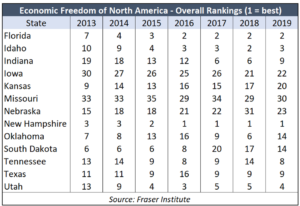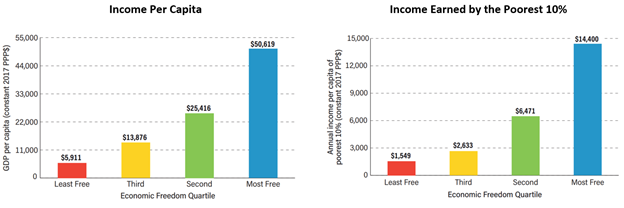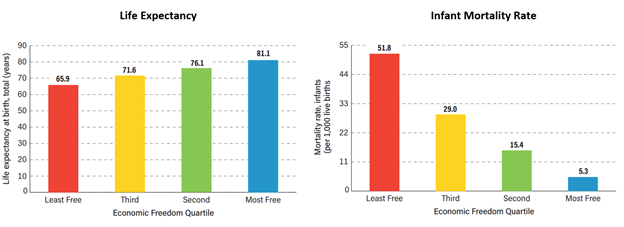Kansas falls from the 17th most free place in North America to the #20 slot, finds the Economic Freedom of North America report released today by the Fraser Institute, an independent, non-partisan Canadian public policy think-tank.
The Sunshine State recorded its worst ranking since 2013 when it was the 9th most free in North America. While Kansas has been on a steady decline in economic freedom, some states are improving.
 Florida moved up from #7 in 2013 to #2 in 2016 and has since held that position. Idaho moved from #10 to #3, Indiana improved from #19 to #9, and New Hampshire moved into first place from #3.
Florida moved up from #7 in 2013 to #2 in 2016 and has since held that position. Idaho moved from #10 to #3, Indiana improved from #19 to #9, and New Hampshire moved into first place from #3.
Tennessee, Texas, and Utah also improved their economic freedom rankings.
Economic freedom—the ability of individuals to make their own economic decisions about what to buy, where to work, and whether to start a business—is fundamental to prosperity.
“When governments allow markets to decide what’s produced, how it’s produced and how much is produced, citizens enjoy greater levels of economic freedom,” said Fred McMahon, the Dr. Michael A. Walker Research Chair in Economic Freedom at the Fraser Institute and co-author of this year’s Economic Freedom of North America report, which measures government spending, taxation and labor market restrictions using data from 2019, the latest year of available comparable data.
Economic Freedom improves the quality of life
Fraser’s 2021 Economic Freedom of the World report shows people in the top quartile of the most free nations have almost twice the per-capita income of those in the second quartile ($50,619 vs. $25,416). The economic benefits are universal across all income levels.
In fact, the per-capita income of the poorest 10% of the most free nations ($14,400) is higher than the average per capita income of more than half the nations in the world. The average income of those in the third quartile is $13,876 and it’s just $5,911 for the those in the lowest quartile.

And the benefits go far beyond income.
Life expectancy improves in direct proportion with economic freedom. It’s just 65.9 years among the least free nations and 71.6 years in the third quartile. Nations in the second quartile have a life expectancy of 76.1 years and it is 81.1 years in the most free nations.

The same is true of infant mortality. Nations in the least free quartile have almost a 52% infant mortality rate. It falls to 29% in the third quartile; nations in the second quartile have a 15% mortality rate and the rate in the most free nations is about 5%.
Barriers to economic freedom in Kansas
A high tax burden is the greatest barrier to economic freedom in Kansas.
Kansas has the highest effective tax rates on mature businesses (Tax Foundation), the 9th-highest state and local sales tax rate (Tax Foundation), and some of the highest effective property tax rates in the nation (Lincoln Institute of Land Policy).
Every state provides the same basket of services, but some states do so at much lower prices, and that’s what allows them to have lower taxes. In 2019, the states that tax income spent 56% more per resident than the states without an income tax; Kansas spent 42% more than the states without an income tax.
Regulations deprive many Kansans of the right to earn a living. Occupational licensing restrictions that restrict competition in medical professions, personal services, and other industry sectors must be removed. Failure to conform state law with the U.S. Supreme Court ruling in Janus v. AFSCME also forces some teachers and other public employees to pay union dues against their will.

